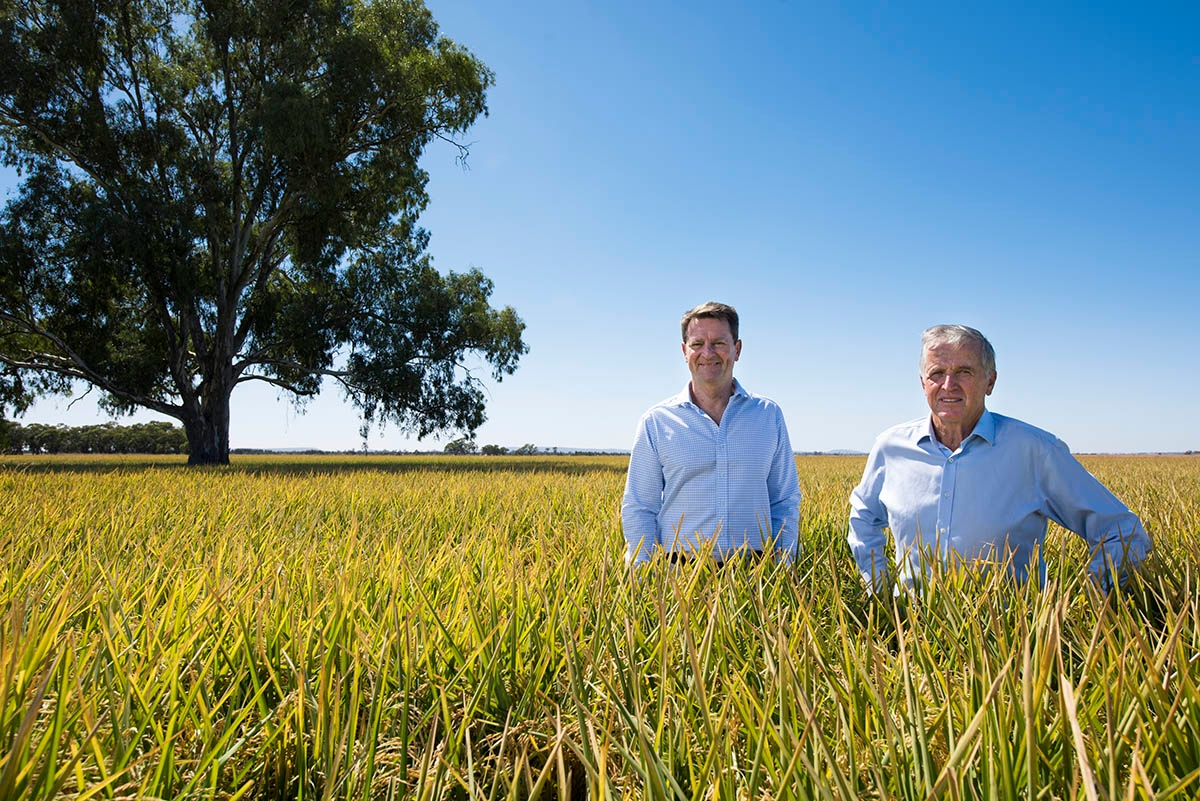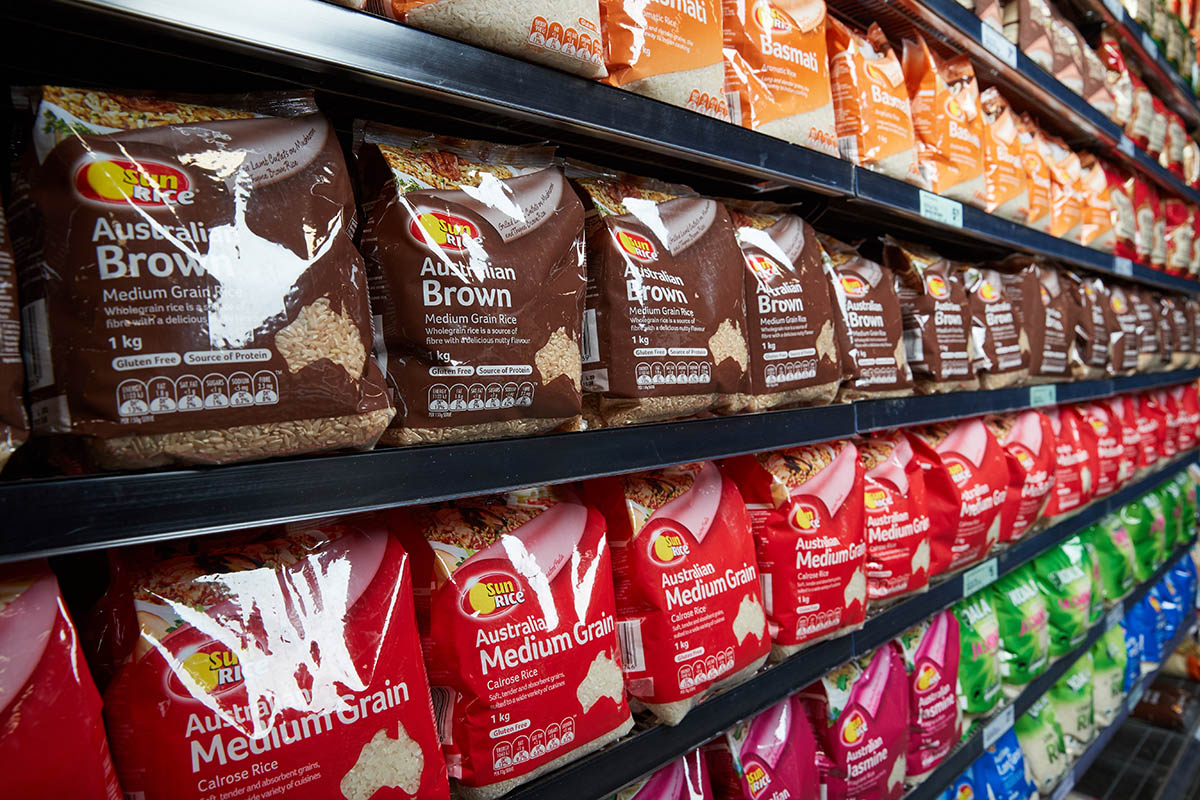Originally published 17 December 2021 | Updated 4 May 2023
This article was updated to reflect changes in relation to the Australia-UK Free Trade Agreement (A-UK FTA).
All smiles at SunRice as landmark Australia-UK FTA diversifies markets
‘This Free Trade Agreement is a great result for the Australian rice industry, and retail and food service consumers in the UK.’ - Rob Gordon, CEO, SunRice Group
There were smiles all round at the SunRice Group when the Australian and UK Governments signed their Free Trade Agreement (FTA).
‘This FTA is a significant market access outcome for Australian rice exports the Government has delivered in recent history,’ says SunRice Group Chairman and rice grower, Laurie Arthur. ‘It will ensure yet another high-value market for our premium-branded Australian rice products.’
SunRice Group CEO, Rob Gordon, says the immediate removal of hefty tariffs and constrained quotas would deliver real benefits for the Australian rice industry.
‘The FTA will open up the UK market for us. It will help us diversify and increase exports of our high-quality branded Australian rice products to a market that was, until recently, severely restricted.’
A market of 67 million people
The UK, a nation of 67 million people, imports all of its rice. The FTA opens the way for SunRice’s Australian varieties to complement the predominant Indica and Japonica imports.
‘The removal of tariffs will now mean that we can develop the UK as another market for our high-quality medium-grain rice varieties,’ says Gordon. ‘Australia is a renowned producer of high-quality medium-grain rice varieties, which are valued by consumers and customers in many of our 60 global markets, including our long-standing ‘Sunwhite’ brand in the Middle East.
‘We are also developing plans to build sales of our short-grain varieties in the UK, which are already sold into premium restaurants and are highly valued by UK consumers. It’s a grain that is perfect for sushi, and the removal of prohibitive tariffs should allow greater opportunity for growth.’
 SunRice CEO Rob Gordon and SunRice Chairman Laurie Arthur
SunRice CEO Rob Gordon and SunRice Chairman Laurie Arthur
From little things – big things grow
Australia’s rice industry can trace its roots back to 1905, when Jō Takasuka and his wife, Ichi, arrived from Japan. Within months, they sowed 14 hectares of Japanese rice grain. By 1911 they made their first commercial sale. Three years later, from the flood plains of the Murray River, Takasuka sold his first crop of rice seed. This crop laid the foundations for today’s rice industry and the SunRice Group.
Today, the SunRice Group is one of the world’s largest rice food companies. It started as a ricegrowers’ cooperative founded by farmers in the Riverina region in 1950. It is now a diversified food company and one of Australia’s leading branded food exporters.
SunRice took a significant step in varying its range of rice in 1995. It partnered with a Japanese rice milling company to launch a new variety into Japan. That variety has since become a favourite.
 SunRice products
SunRice products
Smarts and science combine to protect biodiversity and create efficiency
Listed on the Australian Securities Exchange, the SunRice Group employs over 2,000 people. Its Australian employees are mostly located in rural and regional Australia. It has a significant cohort in its global operations. The company sells high-value branded products into more than 50 markets, with operations in 10 countries. The group creates value-added products that combine manufacturing and R&D smarts with the wealth of Australia’s geography.
SunRice and its growers – together with university and government partners – are focused on delivering the Australian rice industry’s aspirational water efficiency target of 1.5 t/ML, improving on more than 30 years of investment in rice research capability.
Australian rice also has one of the world’s highest yields per hectare. Farmers only grow their crops when water is available to maintain the rice-growing region’s environmental health and biodiversity.
When it comes to the circular economy, SunRice has structured its business to create value-add by-products from the rice milling process. This includes producing rice flour from broken grains, creating livestock feed from highly nutritious rice bran and utilising rice hulls for pet bedding.
The SunRice Group are also exporting their industry expertise to well-known rice regions including the Mekong Delta in Vietnam. The Australia-Vietnam Mekong Delta Sustainable Rice Value Chain Project will combine the expertise of 6 organisations:
- The Australian Centre for International Agricultural Research (ACIAR)
- SunRice Group
- University of Queensland (UQ)
- An Giang University
- Can Tho University
- Cuu Long Rice Research Institute (CLRRI).
The Project will connect Vietnamese smallholder rice-growing communities to high-value markets as well as novel pre-breeding research with an aim to develop a disease-resistant rice variety ideal for tropical conditions.
Another important trial underway is looking at reducing greenhouse gas emissions through a more efficient technique in the application of fertiliser.
Free Trade Agreement – a great experience all round
What delights this poster child of Australian value-add agriculture was the consultation and speed with which the FTA was delivered.
‘I congratulate the Australian and UK Governments for delivering on their trade liberalisation goal,’ says Gordon. ‘The Australian Government – and in particular the Federal Minister for Trade and Tourism, Senator the Hon Don Farrell, the former Federal Minister for Trade, Tourism and Investment, Dan Tehan, and their teams – have done an outstanding job in securing such a significant market access outcome for rice. And in getting the entire deal finalised so quickly.
‘We appreciated the open and collaborative way in which they engaged with the industry throughout the negotiations. We look forward to continuing to work together to liberalise the remaining tariff and quota arrangements for our long grain varieties.’
Go further, faster with Austrade
Austrade’s Go Global Toolkit helps you learn the export basics, find the right markets and understand market requirements.